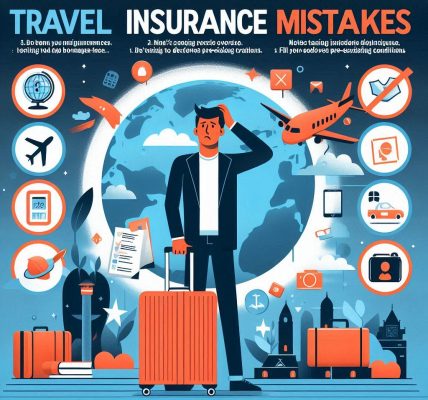Introduction
Traveling alone can be an exhilarating experience, offering complete freedom and self-discovery. However, solo travel also comes with its own set of risks and uncertainties. From medical emergencies to trip cancellations, lost baggage, and unexpected delays, a good travel insurance policy can provide much-needed peace of mind.
In this guide, we’ll explore the essential aspects of choosing the right travel insurance for solo travelers, ensuring you get the best coverage for your adventures.
Why Solo Travelers Need Travel Insurance
Unlike group travelers who may have companions to rely on in emergencies, solo travelers are entirely responsible for handling unforeseen situations. Here’s why travel insurance is a must:
- Medical Emergencies – Without a travel companion to assist, insurance ensures solo travelers get the necessary medical care without financial burden.
- Trip Cancellations & Interruptions – If illness, a family emergency, or other covered reasons force you to cancel or cut your trip short, you can recover non-refundable expenses.
- Lost or Stolen Belongings – Losing essential items such as passports, wallets, or luggage can be particularly challenging when traveling alone.
- Emergency Evacuation – In case of natural disasters, political unrest, or serious health issues, travel insurance covers emergency evacuation costs.
- Flight Delays & Missed Connections – If a delayed flight causes you to miss a crucial connection, insurance can cover rebooking costs and accommodation.
Key Features to Look for in Travel Insurance for Solo Travelers
When choosing a travel insurance policy as a solo traveler, make sure it includes the following key coverage areas:
1. Medical Coverage
- Covers doctor visits, hospital stays, and medications.
- Emergency medical evacuation for severe injuries or illnesses.
- 24/7 medical assistance services.
2. Trip Cancellation & Interruption Insurance
- Reimburses prepaid expenses if you have to cancel due to illness, emergencies, or unforeseen events.
- Covers additional costs if your trip is interrupted after departure.
3. Lost, Stolen, or Delayed Baggage
- Compensation for lost or stolen luggage, passport, and personal belongings.
- Covers essential purchases if baggage is delayed for an extended period.
4. Personal Liability Coverage
- Protects against claims if you accidentally injure someone or damage property.
5. 24/7 Assistance Services
- Access to emergency support, including translation services, lost passport help, and legal assistance.
How to Choose the Best Travel Insurance as a Solo Traveler
With numerous travel insurance options available, follow these steps to find the best plan:
1. Assess Your Travel Needs
- Are you traveling internationally or domestically?
- Will you be engaging in high-risk activities (hiking, scuba diving, skiing)?
- Do you need coverage for valuables such as electronics or cameras?
2. Compare Policies from Multiple Providers
- Look at coverage limits, exclusions, and additional benefits.
- Read customer reviews to gauge the insurer’s reputation and claims process.
3. Check for COVID-19 Coverage
- Some insurers offer specific coverage for trip cancellations, medical treatment, or quarantine expenses related to COVID-19.
4. Ensure Emergency Support Availability
- Pick a policy that offers 24/7 customer support, especially if traveling in different time zones.
5. Consider Annual vs. Single Trip Insurance
- If you travel frequently, an annual multi-trip policy may be more cost-effective than purchasing insurance for each trip.
Travel Insurance Exclusions to Watch Out For
While travel insurance is essential, not everything is covered. Be mindful of these common exclusions:
- Pre-existing Medical Conditions – Some policies don’t cover medical conditions you had before purchasing insurance.
- Extreme Sports & Activities – High-risk activities like skydiving, bungee jumping, or off-piste skiing may require additional coverage.
- Alcohol or Drug-Related Incidents – Claims related to accidents occurring under the influence may be denied.
- Negligence or Carelessness – Leaving personal belongings unattended or failing to take precautions may void coverage.
How to File a Travel Insurance Claim as a Solo Traveler
If you need to make a claim, follow these steps:
- Report the Issue Immediately
- Notify your insurer as soon as possible.
- Report theft or loss to local authorities and obtain a police report.
- Gather Documentation
- Keep all receipts, medical reports, and relevant documentation to support your claim.
- Submit the Claim on Time
- Most policies have a time limit for filing claims; submit yours promptly.
- Follow Up
- Stay in touch with your insurer for updates on claim processing.
Best Travel Insurance Providers for Solo Travelers
Here are some top-rated travel insurance providers known for offering excellent solo traveler coverage:
- World Nomads – Best for adventure travelers.
- Allianz Travel Insurance – Reliable for comprehensive global coverage.
- Travel Guard by AIG – Good for trip cancellation and medical emergencies.
- AXA Assistance USA – Provides extensive medical coverage.
- SafetyWing – Great for long-term travelers and digital nomads.
Conclusion
As a solo traveler, having the right travel insurance ensures you are protected from unexpected financial losses and emergencies. Whether it’s medical coverage, trip cancellations, or lost belongings, choosing the right policy can make all the difference in your travel experience.
Before your next adventure, take the time to research, compare policies, and pick the best travel insurance tailored to your needs. With the right coverage in place, you can explore the world confidently and worry-free!




